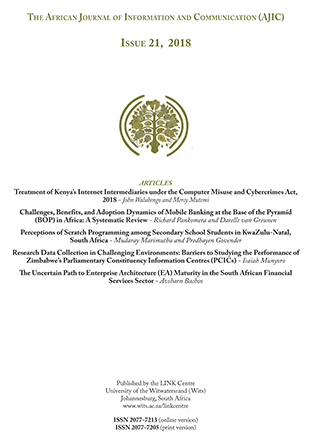Treatment of Kenya's Internet Intermediaries under the Computer Misuse and Cybercrimes Act, 2018
Keywords:
Computer Misuse and Cybercrimes Act, Kenya, internet intermediaries, intermediary liability, cybercrimeAbstract
Kenya has this year enacted the Computer Misuse and Cybercrimes Act, 2018. This article reviews the Act from the perspective of internet intermediaries, with a view to establishing the impact the Act is expected to have on intermediaries' operations. The article outlines key concerns regarding the Act's provisions in respect of obligations and liabilities of intermediaries, particularly with regard to obligations to support state agencies. Recommendations are made for how the Act could be amended to cater more optimally to both state and intermediary concerns.
References
Article 19. (2013). Internet intermediaries: Dilemma of liability. Retrieved from https://www.article19.org/wp-content/uploads/2018/02/Intermediaries_ENGLISH.pdf
Best, M. L. (2004). Can the internet be a human right? Human Rights C Human Welfare, 4(1), 22–31.
Business Daily. (2018, April 6). Two men charged with hacking into Safaricom system. Retrieved from https://www.businessdailyafrica.com/corporate/Two-men-charged-with-hacking-Safaricom-system/539550-3880240-140vv0az/index.html
Cheeseman, N. (2008). The Kenyan elections of 2007: An introduction. Journal of Eastern African Studies, 2(2), 166–184. https://doi.org/10.1080/17531050802058286 DOI: https://doi.org/10.1080/17531050802058286
Communications Authority of Kenya (CAK). (2017). First quarter sector statistics report for the financial year 2017/2018 (July-September 2017). Retrieved from http://www.ca.go.ke/index.php/statistics
Council of Europe (2001). Convention on Cybercrime (Budapest Convention).
Dinwoodie, G. B. (Ed.). (2017). Secondary liability of internet service providers. Springer. https://doi.org/10.1007/978-3-319-55030-5 DOI: https://doi.org/10.1007/978-3-319-55030-5
Englander, E., Donnerstein, E., Kowalski, R., Lin, C. A., & Parti, K. (2017). Defining cyberbullying. Pediatrics, 140(Supplement 2), S148–S151. doi:10.1542/peds.2016-1758u DOI: https://doi.org/10.1542/peds.2016-1758U
George Andare v the Attorney General C 2 Others [2016] eKLR, High Court of Kenya.
Gürkaynak, G., Yılmaz, İ., & Durlu, D. (2013). Understanding search engines: A legal perspective on liability in the Internet law vista. Computer Law C Security Review, 29(1), 40–47. https://doi.org/10.1016/j.clsr.2012.11.009 DOI: https://doi.org/10.1016/j.clsr.2012.11.009
Hornik, J., & Villa llera, C.(2017). An economic analysis of liability of hosting services: Uncertainty and incentives online. Bruges European Economic Research Papers 37/2017.
International Telecommunication Union (ITU). (2017) Global cybersecurity index. Geneva. Kerr, I. R., & Gilbert, D., (2004). The role of ISPs in the investigation of cybercrime. In T. Mendina, & J. L. Britz (Eds.) (2004), Information ethics in an electronic age: Current issues in Africa and the world (pp. 163–172). Jefferson, NC: McFarland and Company.
Kerr, O. S. (2005). Search warrants in an era of digital evidence. Mississippi Law Journal, 75(1), 85–145.
Kreimer, S. F. (2006). Censorship by proxy: The First Amendment, internet intermediaries, and the problem of the weakest link. University of Pennsylvania Law Review, 155(1), 11–101. https://doi.org/10.2307/40041302 DOI: https://doi.org/10.2307/40041302
Kurbalija, J. (2016). An introduction to internet governance. Switzerland: Diplo Foundation.
MacKinnon, R., Hickok, E., Bar, A., & Lim, H. I. (2015). Fostering freedom online: The role of internet intermediaries. Paris: UNESCO.
Mittal, I. P. S., & Sharma, P. (2017). A review of international legal framework to combat cybercrime. International Journal of Advanced Research in Computer Science, 8(5), 1372–1374. https://doi.org/10.2139/ssrn.2978744 DOI: https://doi.org/10.2139/ssrn.2978744
Ndemo, B., & Weiss, T. (Eds.) (2016). Digital Kenya: An entrepreneurial revolution in the making. Springer. https://doi.org/10.1057/978-1-137-57878-5 DOI: https://doi.org/10.1057/978-1-137-57878-5
Perset, K. (2010). The economic and social role of internet intermediaries. Paris: OECD. https://doi.org/10.1787/5kmh79zzs8vb-en DOI: https://doi.org/10.1787/5kmh79zzs8vb-en
Rainie, L., Kiesler, S., Kang, R., Madden, M., Duggan, M., Brown, S., & Dabbish, L. (2013). Anonymity, privacy, and security online. Washington, DC: Pew Research Center.
Republic of Kenya. (1963). Evidence Act, 1963.
Republic of Kenya. (1998a). Kenya Communications Act, 1998.
Republic of Kenya. (1998b). Kenya Information and Communications Act (KICA), 1998. Republic of Kenya. (2001). Mutual Legal Assistance Act, 2001.
Republic of Kenya. (2006). Sexual Offences Act, 2006.
Republic of Kenya. (2008a). Kenya Information and Communications Act, 2008. Retrieved from http://www.ca.go.ke/index.php/sector-legislation
Republic of Kenya. (2008b). National Cohesion and Integration Act, 2008. Retrieved from http://www.kenyalaw.org/lex/actview.xql?actid=No.%2012%20of%202008
Republic of Kenya. (2010). Constitution of Kenya, 2010. Retrieved from http://kenyalaw.org/kl/index.php?id=398
Republic of Kenya. (2013). Kenya Information and Communications (Amendment) Act, 2013. Retrieved from http://www.ca.go.ke/index.php/sector-legislation
Republic of Kenya. (2018). Computer Misuse and Cybercrimes Act, 2018. Retrieved from http://kenyalaw.org/kl/fileadmin/pdfdownloads/Acts/ComputerMisuseandCybercrimesActNo5of2018.pdf
Serianu, K. (2017). Cybersecurity report 2017: Demystifying Africa’s cyber security poverty line.
Retrieved from http://www.serianu.com/resources.html
Sloot, B. (2015). Welcome to the jungle: The liability of internet intermediaries for privacy violations in Europe. J. Intell. Prop. Info. Tech. C Elec. Com. L., 6(3), 211–228.
Technology Coalition.(2015).Employeeresilienceguidebookforhandlingsexualexploitationimages. Retrieved from http://www.technologycoalition.org/wp-content/uploads/2015/01/TechnologyCoalitionEmployeeResilienceGuidebookV2January2015.pdf
Truyens, M., & Van Eecke, P. (2016). Liability of domain name registries: Don’t shoot the messenger. Computer Law C Security Review, 32(2), 327–344. https://doi.org/10.1016/j.clsr.2015.12.018 DOI: https://doi.org/10.1016/j.clsr.2015.12.018
Downloads
Published
Issue
Section
License
Copyright (c) 2018 https://creativecommons.org/licenses/by/4.0

This work is licensed under a Creative Commons Attribution 4.0 International License.
How to Cite
- Abstract 387
- PDF 252


.png)